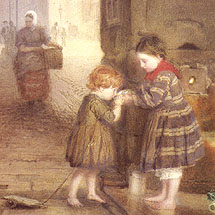| 8. Water, a resource in danger |
 |

Most of the drinking water
we consume comes from the subsoil. If underground pockets
of water are polluted by filtrations of waste from cities,
factories and farms we may soon have serious problems
with our water supply.
Water is a resource and we mustn’t pollute it or
waste it. In addition to treating dirty water, we should
create other means that are less costly in technological,
economic and ecological terms. |


[ enlarge image ] |
 |
| Working with relationships of means
and ends. An end is a goal, something to be
achieved. Means are the techniques and tools we
use to achieve our goals. Evaluating the relationship
between means and ends is an important exercise
in ethics. Evaluation must take into account many
aspects of a situation (consequences, proportion,
alternatives, etc) and combine the critical, creative
and caring dimensions of thinking. |
| Analyse the following cases and indicate
which are the means and which are the ends. Then
consider if the means are appropriate for achieving
the ends. Give reasons for your ideas. |
| 1. |
I would close all factories
to avoid the danger of pollution. |
| 2. |
A good way to eliminate waste
is to dump it into the sea. |
| 3. |
Factories should treat their
wastewater in order not to pollute rivers. |
| 4. |
To keep river water clean, I
would punish all who pollute it. |
| 5. |
To avoid drought, deforestation
should be forbidden. |
| 6. |
If we don't
want to turn the sea into a rubbish tip, we
should treat our wastewater. |
| 7. |
Governments
should invest more in research if we want
to solve the water pollution problem. |
|
|
 |
 |
|
Music. Listen to Au Bord
d’une Source by Franz Liszt. |
 |
| Get information
from your Town Council about the means they use to avoid
water pollution and save water. |
 |
| Visit a water
treatment plant. |

 |
| © Grup IREF 2003, with the support of the European Commission, DG XXII (Socrates/Comenius 3.2) |
[ print ] |
|
|
|
|